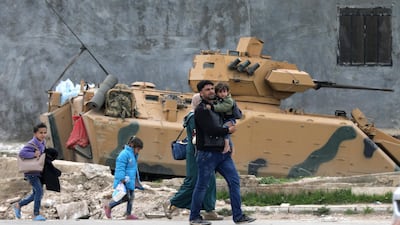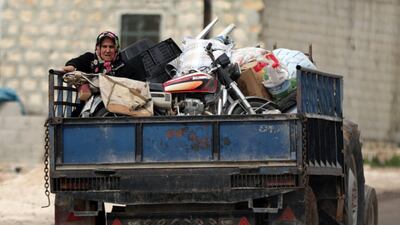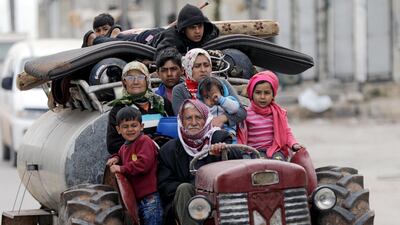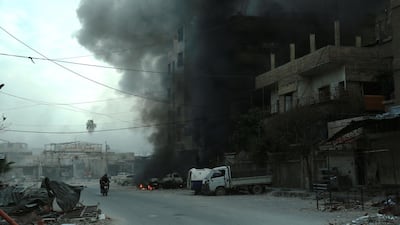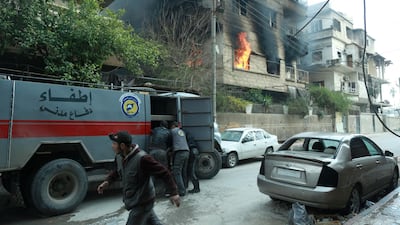Turkish forces and allied Syrian rebels reached the outskirts of Afrin in north-west Syria on Saturday, raising concerns for tens of thousands of civilians trapped in the Kurdish-held town.
"Turkish forces are on the edges of Afrin, less than two kilometres from the town's north-east," said Rami Abdel Rahman, head of Syrian Observatory for Human Rights.
The Britain-based war monitor had earlier reported intense clashes, air strikes and artillery fire about four kilometres from the town as the attacking forces approached from the north-east. It later said they had captured the Brigade 135 military base from Kurdish forces.
Pro-Ankara fighters could be seen taking heavy machine guns and ammunition from the base as they continued to exchange fire with nearby Kurdish fighters, Agence France-Presse reported.
Mr Abdel Rahman said the aim was to besiege Afrin, cutting it off from other areas in the Afrin region, but Turkish president Reccep Tayyip Erdogan said his troops and allied Syrian rebel fighters could break into the town "at any moment".
The town's population has been swelled by the arrival of thousands of civilians from the wider Afrin region who fled the Turkish offensive against the Kurdish People's Protection Units (YPG) militia launched on January 20.
Turkey accuses the YPG of being a branch of the outlawed Kurdistan Workers' Party (PKK), which has waged a three-decade insurgency in south-east Turkey. However, the YPG has been backed and armed by the United States as the main fighting force against ISIL in Syria.
"Once we have purged the terrorists [from Afrin] we will then cleanse them from Manbij, Ain Al Arab [Kobani], Tel Abyad, Ras Al Ayn and Qamishli," Mr Erdogan said in televised comments on Saturday, listing other Kurdish-held areas along Syria's border with Turkey.
The Turkish offensive, which it named "Operation Olive Branch", made slow progress initially but has accelerated after the capture on Thursday of Jandairis, another major town in the Afrin region.
Mr Abdel Rahman said there were "major concerns" for the tens of thousands of civilians trapped in the town of Afrin, with the only route out leading to government-controlled zones in Syria's northern province of Aleppo.
More than 200 civilians have been killed in the offensive so far, according to the Observatory, and at least 370 YPG fighters and 340 rebel fighters. Turkey says 42 of its troops were killed.
Meanwhile the death toll from a separate offensive waged by Syrian government forces approached 1,000 on Saturday after three weeks of heavy bombing and shelling in the rebel-held region of Eastern Ghouta near Damascus.
The Observatory said regime fighters effectively split the rebel territory into three areas on Saturday after seizing control of the road linking the main town of Douma with the town of Harasta further west, and had also captured the town of Misraba.
_______________
Read more:
Turkey urges US to stop more Kurdish militias from entering Afrin
First fighters evacuated from Syria's Ghouta as food goes in
The Syrian conflict is, even now, delivering game-changing surprises
_______________
"Regime forces have therefore divided Eastern Ghouta into three parts – Douma and its surroundings, Harasta in the west, and the rest of the towns further south," it said.
The gains came amid heavy bombardment that has continued despite a call by the UN Security Council for 30-day ceasefire.
"The bombing is so intense. Warplanes haven't left the skies for 24 hours," opposition activist Anas Al Dimashqi told Associated Press via text messages from the rebel-held town of Kfar Batna. "The advance is the result of a scorched earth policy."
Syrian state TV aired live footage from inside Misraba and said troops were less than a kilometre from joining up with government forces advancing from the western side, which would cut off northern parts of Eastern Ghouta from the south of the region.
President Bashar Al Assad's forces launched the offensive to retake Eastern Ghouta, the last rebel-held area near Damascus, on February 18 with air support from Russia.
The Observatory said three weeks of fighting have left 976 people dead, including nearly 200 children. The group said the dead also include 146 soldiers and pro-government gunmen. The region has been under government siege since 2013 and is home to about 400,000 people.
Nearly half a million people have been killed in Syria's seven-year conflict that has pitted the Assad government and its main backers, Russia and Iran, against rebel forces supported by the West, Arab nations and Turkey.
However, Turkey's ties with Gulf Arab states have recently become strained over its support for Qatar, which the UAE, Saudi Arabia, Bahrain and Egypt have boycotted since June last year over its support for terrorism and extremism, and its growing ties with Iran.
On Saturday, the UAE Minister of State for Foreign Affairs Dr Anwar Gargash called on Turkey to respect the sovereignty of Arab states, saying support for regime change by violence would be unwise.
"It is no secret to the observer that the Arab-Turkish relations are not at their best, and that the return of balance to Ankara should take into account Arab sovereignty and deal with its neighbours wisely and rationally," Dr Gargash said on Twitter.
Turkey, along with Qatar, is also a supporter of the Muslim Brotherhood, which Egypt, Saudi Arabia and the UAE have declared a terrorist group. Ankara's growing ties with Tehran are also of concern. Iran's forces or its proxies are increasingly involved in regional conflicts, including in Yemen where Saudi Arabia and the UAE are key players in a coalition fighting Iran-backed rebels to restore the internationally recognised government.
"Opposition to the main Arab states and support for movements that seek to change regimes by violence does not represent a rational approach to the neighbourhood, and Ankara is required to respect the sovereignty and respect of the Arab states," Dr Gargash said in a second tweet.
